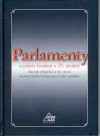The project examines the legal and institutional environment in the Czech Republic, the effect of the most prominent collective actors prior to its accession to the European Union, and changes that are occuring due to the process of Europeanisation. It also explores new challanges resulting from the full integration of the Czech Republic into the EU political and decision-making mechanisms, the creation of mechanisms to influence European and national politics, and the impact of collective actors within a pan-European political arena.
The project also concentrates on analysing the existing institutional structures for interest mediation between individuals, social groups, organizations and the State, and the influence of these structures on the legal system. At the core is interest in the political institutions involved in the process, civil participation, the activities of the most prominent political actors (political parties and interest groups in a wide sense of the world) and the attitudes of these actors toward the studied institutions and each other.
Publikace vydané v rámci projektu (celkem 36, zobrazeno 31 - 36)
Using one of the first surveys of party members undertaken in Central and Eastern Europe, this study outlines the socio-demographic and attitudinal profile of Czech Christian Democratic (KDU-ČSL) party members. An exploration of the cohesiveness of KDU-ČSL party members and Czech parliamentary party groupings (PPGs) demonstrates that the power of middle level party elites to exert influence on the legislative process is determined by issue area and party.
The first decade of the Czech democratic Parliament has seen the development of a newly conceptualised, bicameral Parliament in a new State. We identify general tendencies toward stabilisation, similar to Western European parliamentary practices. Another trend is the gradual change from organising the Parliament according to the majority principle to that of consensus.
Political parties in the post-communist countries are said to focus on electoral strategies and not on organizational building. Based on the detailed research of Czech political parties, we argue that political parties facing an environment that was hostile to organised partisanship adapted their organizational strategies to make party membership more attractive. Even though they experience a continually falling number of members or at least their stagnation.
It aims to answer the question, whether the national Parliaments loose their democratic functions and are becoming rubber-stampers in the executive-driven process of Europeanization. The institutional level analysis analyzes changes of the formal structures of CEE legislatures and their functioning (changes in committee structure, changes international cooperation, etc.).
The chapter focuses on Europeanization of interest structures, namely Europeanization of industrial relations on the company level, first of all in case of supranational company. Attention is paid to the conflict of concepts of industrial relation in the mother company and the daughter one., to the role of European Workers Councils in the process of Europeanization of industrial relations.
The paper deals with the influence of foreign direct investment on the Europeanization of industrial relations under the term sof ongoing economic and political integration of Europe. The foreign direct investment in CEE countries can play a considerable role in modernizationof the economy and the social welfare state.
Pages
- « first
- ‹ previous
- 1
- 2
- 3
- 4




Newsletter
Facebook
X
Tweets by SociologickyNewsletter